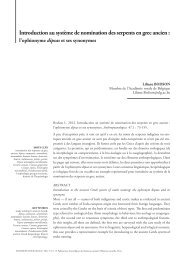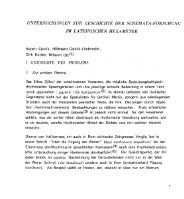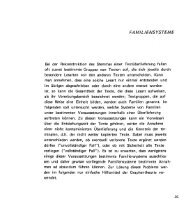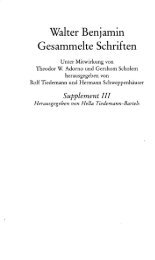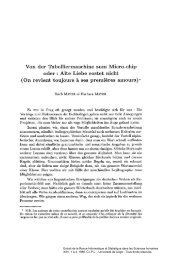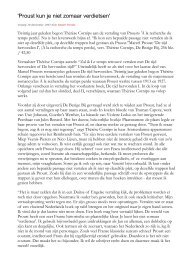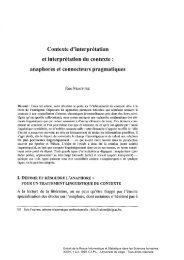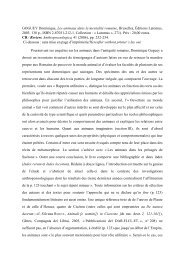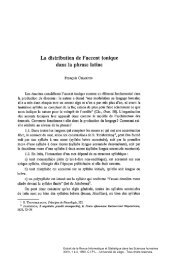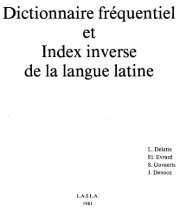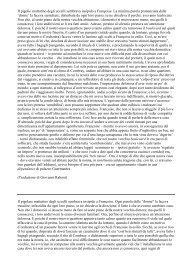The Lessico Intellettuale Europeo and its Activities - Université de ...
The Lessico Intellettuale Europeo and its Activities - Université de ...
The Lessico Intellettuale Europeo and its Activities - Université de ...
Create successful ePaper yourself
Turn your PDF publications into a flip-book with our unique Google optimized e-Paper software.
THE LESSICO INTELLETfUALE EUROPEO AND ITS AcnVlTiES 233<br />
Lexical electronic filing <strong>and</strong> conceptual analysis merge in the Glossario<br />
filosofico ebraico-italial/o <strong>de</strong>i XIII secol0 34 in which Giuseppe Set'moneta combines<br />
the terrninological element <strong>and</strong> analytic commentary, illustrating the <strong>de</strong>velopment<br />
of a linguistic legacy of medieval Jewish culture <strong>and</strong> ils subsequent<br />
reception.<br />
With regard to lexical electronic filing, as we have seen the LIE series of<br />
publications inclu<strong>de</strong>s many concerning works of ancient <strong>and</strong> medieval culture,<br />
however, by far the largest number is <strong>de</strong>voted to the period between the<br />
sixteenth <strong>and</strong> eighteenth centuries. Here it is possible to observe the <strong>de</strong>dine<br />
of Latin as the principal means of communication among the learned, <strong>and</strong><br />
<strong>its</strong> slow, but inexorable replacement by national languages. In this continuai<br />
exchange with Latin, the philosophical vocabulary is evi<strong>de</strong>nce of the evolution,<br />
transformation <strong>and</strong> consolidation of intellectnal terminology.<br />
Descartes is a case in point. A bilingnal author par excellel/ce, he chooses<br />
Latin for his more purely "philosophieal" works, but he coins new words,<br />
attributes new meanings to old \Yords or even introduces Latin terms or<br />
sentences into French contexts, when he does not <strong>de</strong>em the latter sufficient<br />
to ren<strong>de</strong>r the lexical richness <strong>and</strong> appropriateness of certain Latin expressions.<br />
<strong>The</strong> in<strong>de</strong>xes of the Reglilae ad directiol/em il/gel/Ii <strong>and</strong> of the Discollrs <strong>de</strong> la<br />
métho<strong>de</strong>, compiled respectively by l-R, Armogathe <strong>and</strong> l-L, Marion, <strong>and</strong> by<br />
P.-A. Cahné as part of the Éqllipe Descartes 35 research projects, allow one to<br />
analyze this phenomenon from the exhaustive electronic filing of two major<br />
works of mo<strong>de</strong>rn philosophical thought.<br />
Though Baruch Spinoza's philosophical work appears more well-knit <strong>and</strong><br />
to be written only in Latin, it is possible to find Hispanisms, major variations<br />
in spelling <strong>and</strong> anomalous forms in his vocabulary; new me31llng is given to<br />
traditional terrninology, following Descartes'lexical <strong>and</strong> philosophical example.<br />
<strong>The</strong> II/dici <strong>de</strong>i "Trac/allls <strong>de</strong> intel/ectlls emel/datiol/e" <strong>and</strong> of the Trac/atlls<br />
theologico-politicllS 36 are instruments for examining Spinoza's terminology in<br />
<strong>de</strong>pth, both have been published in "Lexicon philosophicum", the LIE jonrnal;<br />
they almost complete the electronic filing of Spinoza's works, that began with<br />
34 Cf. Pllbblicazioni, no. 1.<br />
35 Cf. Pubblicaziolli, no. 10 <strong>and</strong> 12.<br />
36 Cf. CANONE (E.), TOTARO (G.): 1991, "I1'Tractatus <strong>de</strong> intelJectus emendatione' di Spinoza.<br />
In<strong>de</strong>x locorum", Lexicoll Philosophicum, 5, pp. 21-127; TOTARO (G.), VENEZIANI (M.): 1993,<br />
"Indicî e concordanze <strong>de</strong>i '1factatus theologico-politicus' di Spinoza", ibid., 6, pp. 51-204.<br />
Extrait <strong>de</strong> la Revue Informatique et Statistique dans les Sciences humaines<br />
XXX, 1 à 4, 1994. C.I.P.L. - <strong>Université</strong> <strong>de</strong> Liège - Tous dro<strong>its</strong> réservés.



